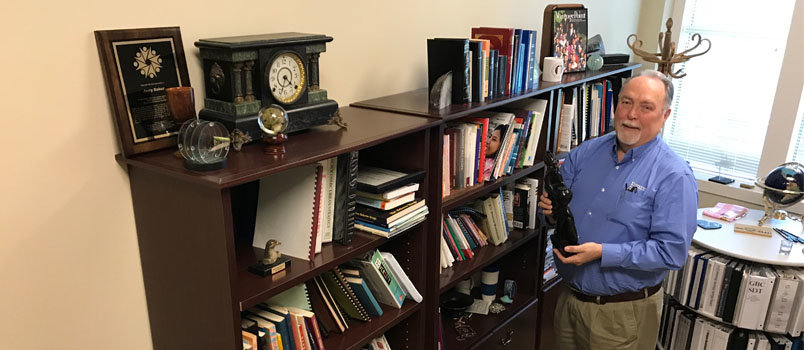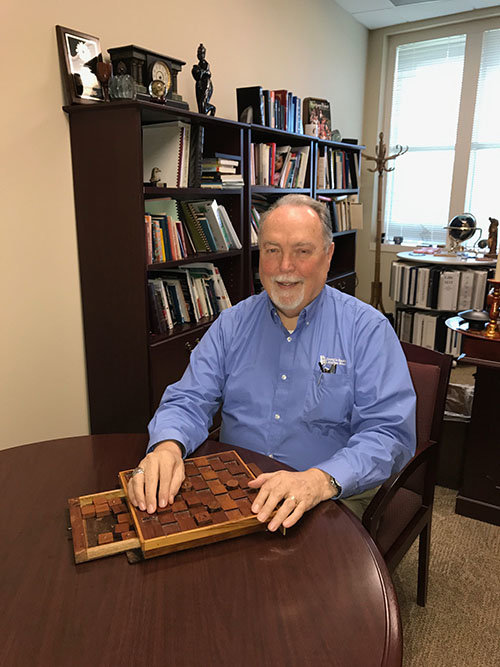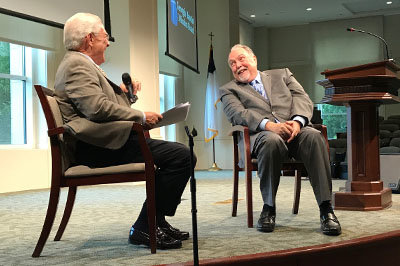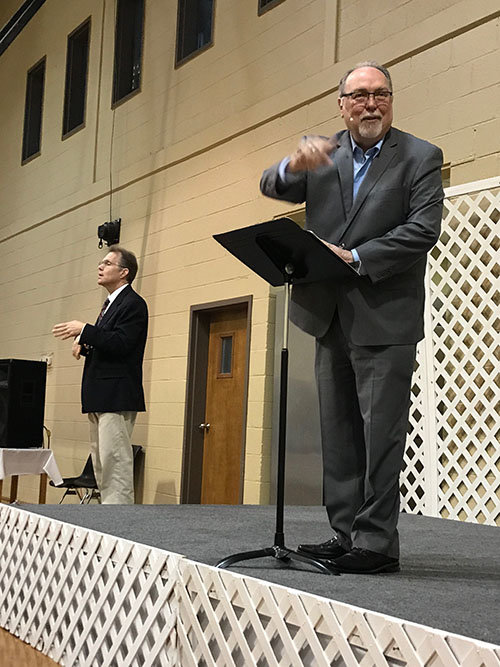 Jerry Baker, who retired on July 31 after 40 years service to Georgia Baptists, begins to pack away some of his office memorabilia. JOE WESTBURY/Index
Jerry Baker, who retired on July 31 after 40 years service to Georgia Baptists, begins to pack away some of his office memorabilia. JOE WESTBURY/IndexGreat ministries frequently grow from small acorns.
What began as a recruitment of a state missionary to continue Georgia Baptists’ ministry to the state’s growing deaf population has grown into one of the largest ministries to internationals in the Southern Baptist Convention.
When department head Jerry Baker turned out the lights in his office for the last time on July 31, he left a multifaceted ministry now called Intercultural Church Planting and Missions Ministry. The groundwork he has laid during “40 years plus a couple of weeks”provided a secure foundation for the expansion of that ministry for generations to come.
He retired as one of Georgia Baptists’ longest-serving employees.
That ministry acorn was planted four decades ago this month when Georgia Baptist Evangelism and Missions Division Director Ernest Kelley brought the young Baker from California to Georgia to head the Mission Board’s deaf ministry and lead the 35 ministries in six languages along with 35 deaf ministries. At the time, Baker had been serving for nearly six years as a Home Mission Board missionary at the California Southern Baptist Convention.
In those days immigrants and refugees were few and far between and Southern Baptists focused their outreach among the nation’s hearing impaired. It wasn’t until the flood of refugees and growth of immigration in the 1960s that the denomination’s ethnic work began a steady growth.
But migration is not just an international phenomenon. Baker, a native of Wichita, KS, and his family were part of the massive movement of Americans who flooded into California in search of jobs. As a youth he became interested in the deaf ministry at New Hope Baptist Church in Santa Ana, a small church he attended in Southern California.
 Baker shows a chess board made by skilled woodworker Charlie Craig, a blind and deaf layman who served as the motivation for Baker entering deaf ministry as a young man. JOE WESTBURY/Index
Baker shows a chess board made by skilled woodworker Charlie Craig, a blind and deaf layman who served as the motivation for Baker entering deaf ministry as a young man. JOE WESTBURY/IndexBaker was intrigued when he observed Charlie Craig, a deaf and blind senior adult whose sister Pearl used sign language to communicate with him. The man’s sister interpreted for him by placing his hands on hers as she signed to him.
“He was very personable and a friendship developed between us. He knew everyone by their handshakes, it was just incredible. He also remembered you by placing a hand on your shoulder and remembering your height,” Baker explains.
The individual had a strong Christian testimony for someone who had overcome so many trials. And to further his overcoming nature, he was a skilled woodworker. That “can do” mentality also attracted Baker to him.
“I had felt a call to ministry in my high school years and that encounter gave a definition to that calling,” Baker explains.
That happenstance exposure to the deaf community was Baker’s first experience with cross cultural ministry.
While the hearing world frequently view the deaf as handicapped, the deaf do not see themselves that way; they simply view part of the world with hearing and the other part without hearing. It wasn’t until the 1960s that the Home Mission Board realized that distinction and began to identify the deaf as a separate culture free of the handicapped stereotype.
That was a seismic shift in thinking and tailoring ministry to the nation’s deaf population, Baker explains.
The Southern California resident was eventually licensed by the small 150-member church and began teaching signing to students at California Baptist College (now University) where he was enrolled. After graduation he served as a Home Mission Board summer missionary, then served a two-year stint through its US-2 (later called USC-2) a parallel to the International Mission Board’s Journeyman program.
“I took advantage of every missions opportunity they offered, which gave me a variety of experiences,” he adds.
That two-year opportunity took him to Whitehall, MT, where he pastored his first and only church. He then refined his calling by attending a year at New Orleans Baptist Theological Seminary and serving as assistant pastor to the deaf at First Baptist Church, before transferring to Golden Gate Seminary in Mill Valley, CA.
It was while he was in New Orleans that the California convention asked him to serve as a missionary to the deaf while a student, with a joint appointment by the HMB as a Student Missionary.
He eventually received his career appointment as a HMB missionary serving through the Convention. After two years of hearing from a variety of unrelated sources, Ernest Kelley called and set a meeting with him in San Francisco. Baker then accepted the offer to move to Atlanta.
“I just came and stayed,” Baker says with a smile and his dry humor.
 Jerry Baker reflects back over his four decades of service while being interviewed by Mission Board Assistant Executive Director Bobby Boswell. The conversation was the Aug. 9 chapel service which preceded Baker's retirement luncheon. JOE WESTBURY/Index
Jerry Baker reflects back over his four decades of service while being interviewed by Mission Board Assistant Executive Director Bobby Boswell. The conversation was the Aug. 9 chapel service which preceded Baker's retirement luncheon. JOE WESTBURY/IndexThe Georgia Convention had a Missionary to the Deaf, Al Fanshaw, who served for 11 years. When his position was reinvented to be Language Program Leader, Kelley could not find anyone with the skills to continue the deaf ministry, as well as the other areas of Language Missions, including Literacy Missions.
Kelley knew Baker was his man.
Baker oversaw the growth of the deaf ministry with several churches and ministries planted in the state. As refugees and immigrants began flooding into the area after the fall of South Vietnam, language missions experience an expanded growth, along with adding new staff.
Today, with gratitude to Georgia’s Woman’s Missionary Union and their pioneer work in ESL among ethnics, the Mission Board has a strong presence in the international community. State Missionary Paulette DeHart today oversees that expanded literacy missions ministry in Baker’s office. She provides training statewide and speaks in churches to build visibility for the outreach.
Language Missionaries Moses Valdes and Ada Fernandez were instrumental in launching with the Georgia Baptist Medical/Dental Fellowship the Baptist Mobile Health Ministry. It originally was planned to reach Hispanic Migrant farm workers.
Today, its two mobile units conduct more than 40 clinics yearly across the state to reach migrants, immigrant populations, underserved populations, and ministers without dental insurance. Diana Brown administers this 22-year-old ministry.
Much has occurred in the state since Baker set down roots four decades ago.
“Georgia has moved from being a state with a handful of Cubans, along with Chinese in Augusta, to having the ninth largest ethnic population in the nation,” he states.
 Jerry Baker, retiring state missionary for the Georgia Baptist Mission Board, speaks recently at Clarkston International Bible Church. He will retire on July 31 after 40 years with the Board. JOE WESTBURY/Index
Jerry Baker, retiring state missionary for the Georgia Baptist Mission Board, speaks recently at Clarkston International Bible Church. He will retire on July 31 after 40 years with the Board. JOE WESTBURY/IndexHe was there when Georgia Baptists played a significant role in refugee resettlement, sponsoring entire families and helping them find housing, jobs, and schools for their children. Along the way they heard about Jesus.
The openness of churches to sacrificially host the families and sponsor ethnic congregations is what made the existence of many of today’s self-supporting congregations a reality, Baker says.
Today the Georgia Baptist Mission Board works with 380 ethnic congregations "from Tiger to Bainbridge, from Dalton to Brunswick, in 54 languages and nationalities.” Seventy of those congregations are with the deaf.
Much of that work in 1977 was centered around ethnic populations in the state’s larger cities such as Savannah, Augusta, Columbus, Macon, Atlanta, and Dalton. In addition, literacy missions has among 101 nations in its collective student body statewide.
Ethnic work in Georgia has a strong future, but strong challenges as well. Without being critical, Baker said Baptists need an updated mindset that sees ethnics as moving into the mainstream of Georgia Baptist Mission Board life with their own church buildings rather that meeting in a Sunday School room in a host church. While many congregations begin that way, they move out with increasing frequency and purchase their own property.
The challenge for the Board, he adds, is the ability to service those ethnic groups by providing programming in multiple languages … both print as well as meetings.
While the Board is doing a good job with providing some materials in the big groups – Korean, Hispanic, and Vietnamese – up to 50 other ethnic groups and nationalities are growing and will need similar servicing. Not tomorrow, but that is on the horizon.
Baker checks off groups that are already holding large gatherings and experiencing growth that cannot be ignored.
At 71, Baker has enjoyed the ride but looks forward to life’s new adventures. He and his wife, Brigitte, plan to remain in their Lawrenceville home and stay active in ministry. Brigitte will continue to teach Wednesday evening citizenship classes at Hebron Baptist Church as part of the church’s ESL ministry. She also plans to maintain her volunteer role, several days a month, with Immigrant Hope, which assists with the legal aspects of immigration.
The couple plans to keep their membership at the Dacula church.
Baker will continue to be active on the Board of the Baptist Mobile Health Ministry as well as its Foundation. He will also continue his relationship as a Board member of the Tri-State Deaf School of Theology.
He also will serve through the Ethnic America Network National Committee, the Ethnic American Network Foundation, and on the Board of the Clarkston Baptist Bible Institute, which provides an intense 10-course program that has been condensed from two years to one.
“I’m looking forward to all of the work without the administrative responsibilities,” he says with a laugh.
It’s time to pass that baton along to a younger generation.
Longtime State Missionary Dennis Rivera succeeds Baker on August 1 after 2 months of training. He has served for the last 20 years as Hispanic Missionary in south Georgia, housed in Tifton and currently in Warner Robins.